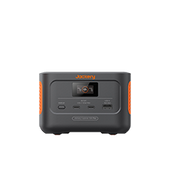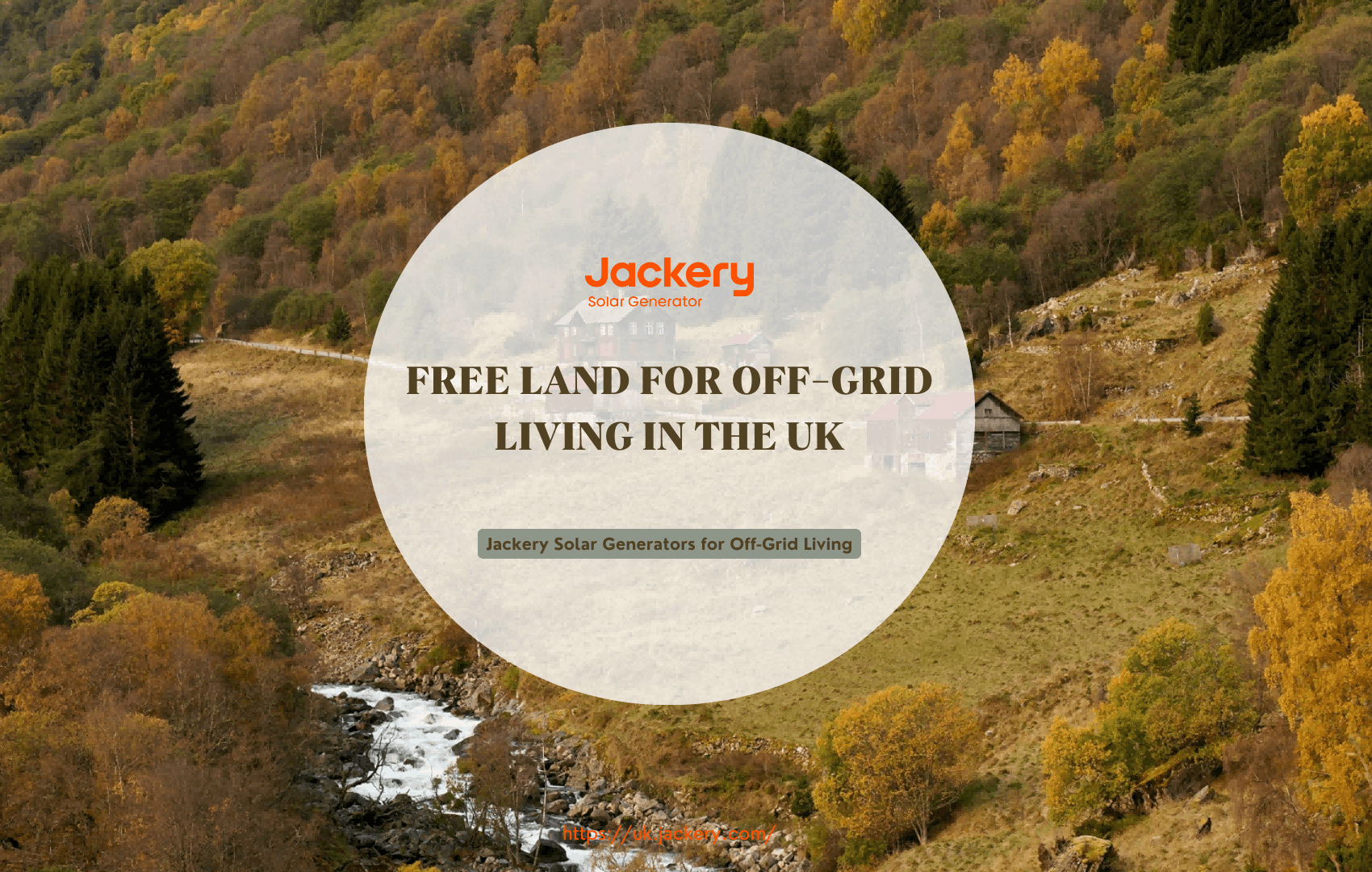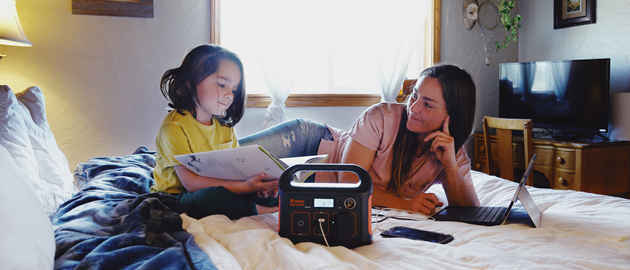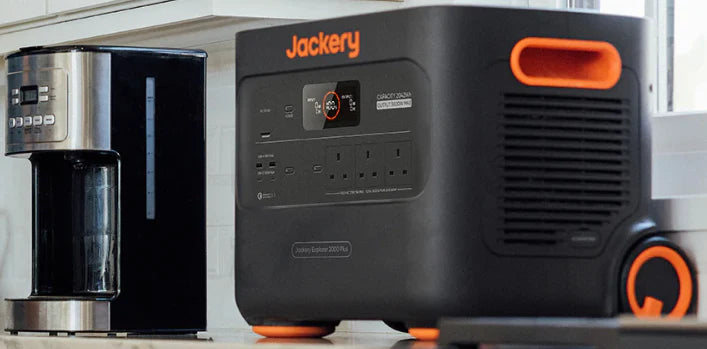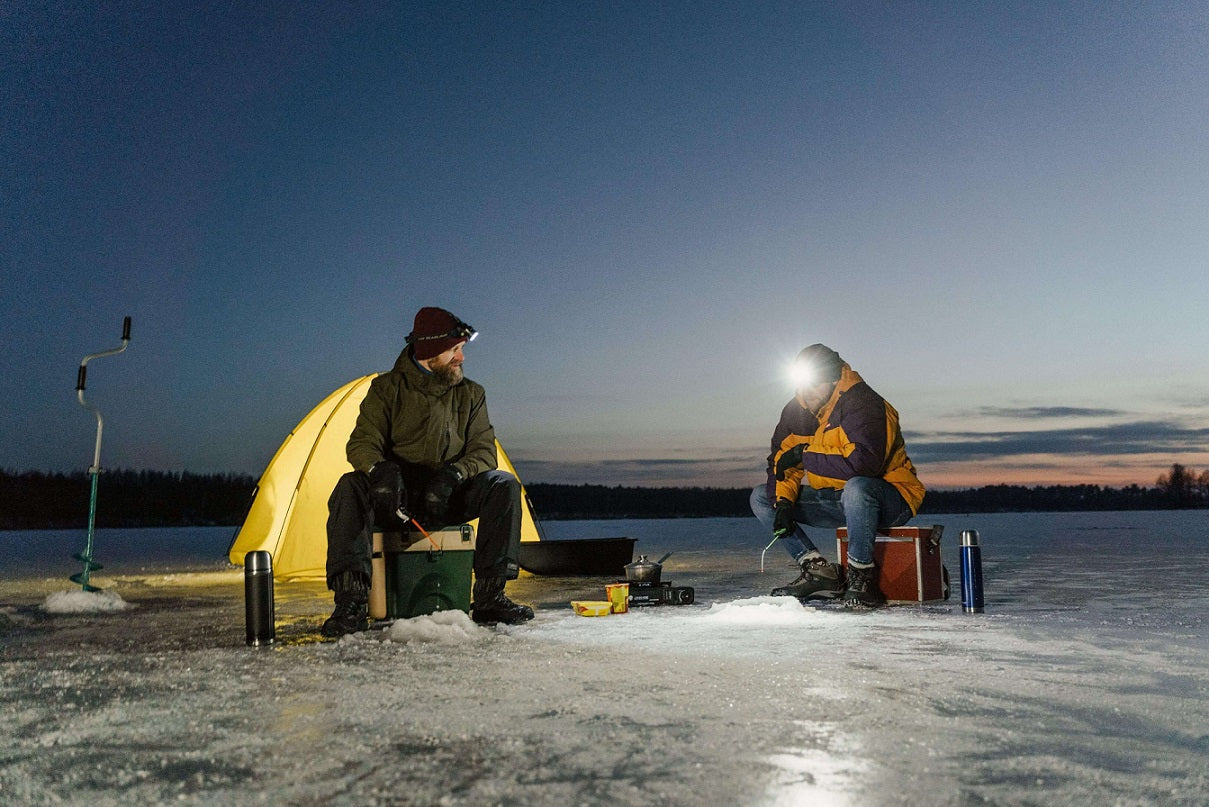Around 83.65% of the UK population lives in urban areas. Expensive, crowded, concrete urban landscapes are blinding more and more Brits to the beauty of the world around them, so people need to escape the stress and chaos of modern life and return to nature.
Off-grid living offers autonomy, sustainability and reduced impact on the environment. Living off-grid in the UK means returning sustainably to the beautiful natural world and finding freedom while living off the land as much as possible.
This guide will show the free land for off-grid living in the UK and some practical living tips. Also, we highly recommend Jackery Solar Generator, the portable solar power solution, to charge your off-grid appliances with unlimited solar energy outdoors.
|
Key Takeaways: |
|
Off-grid living is a way of living that eliminates reliance on utilities, including electricity, water and sewer systems. Off-grid living can benefit health, cost savings, energy independence and sustainability. There are options in the UK to own free land for off-grid living, including community land trusts, permaculture land, and public land. Starting off-grid living in the UK should consider housing, planning permission, electricity systems, water, food supply, drainage and waste disposal. Considering the off-grid power supply, the Jackery Solar Generator 1000 v2 and 2000 Plus can power appliances effectively. |
What Is Off-Grid Living?
What is off-grid living? Off-grid living is a lifestyle choice that eliminates reliance on public utilities, including electricity, water, and sewer systems. This lifestyle is designed for independence and can range from individual homes to entire communities. Many people see off-grid living as a way to escape the stress of the modern world and rediscover what matters most in life.
Off-grid living is when an individual or community is disconnected from public utility services such as electricity, water, and sewage systems. Instead, they rely on alternative energy and technology to meet basic needs. Overall, off-grid living allows people to reduce their reliance on traditional infrastructure while adopting renewable energy and environmentally friendly behaviours.
In the UK, many people have become accustomed to the comforts of luxurious urban living, and going off the grid is a rather tricky task for many people. But living off-grid in the UK means getting back to beautiful nature in a sustainable way. In addition, this lifestyle is often marked by a desire for autonomy, sustainability, and reducing ecological impact.
Why Choose Off-Grid Living?
In the UK, off-grid living means living without utilities such as electricity, water and gas. It includes generating electricity, getting water, and disposing of waste. Overall, off-grid living minimises the negative impact on the planet while giving you unparalleled freedom. Many people in the UK consider adopting off-grid living because of its many benefits.
Cost Savings: In recent years, living costs have been increasing. The price of electricity and other utilities is also rising. While the initial cost may be high, off-grid living can often save you money on utility bills in the long run. Over time, off-grid living can reduce or eliminate monthly utility bills, which will more than make up for the initial investment cost of sustainable energy.
Energy Independence: Off-grid living is mainly immune to energy price fluctuations and outages. For example, generating electricity protects you from grid outages and rising costs. In addition, by living this way, you can take control of essential resources.
Reconnect with Nature: Off-grid living can eliminate the stress of modern life and allow you to return to nature because off-grid sites are often located in the most beautiful and remote places in the world, surrounded by dense forests, natural water sources such as waterfalls or lakes, and abundant wildlife.
Environmental Sustainability: Due to the fast pace of modern life, we are constantly consuming and wasting resources such as information, energy, water or food. Off-grid living has a significantly lower carbon footprint, reducing dependence on fossil fuels and minimising waste.
Better for Health: Off-grid living is better for physical and mental health. Off-grid living puts you in nature, which will help improve mental health and a more focused mind. Combining a peaceful environment, a more active lifestyle, better sleep, and a healthier diet will make you feel happier, which is why many people choose this lifestyle.
Free Land for Off-Grid Living in The UK
Living off the grid can be a liberating and fulfilling experience for anyone who wants to adopt a more self-sufficient and sustainable lifestyle. However, the upfront costs of implementing off-grid living and acquiring land can be prohibitive. Fortunately, there are options in the UK that allow you to own free land for off-grid living.
This section will share different ways to get free or low-cost land for off-grid living in the UK. Three main ways to find low-cost leased land or free land for off-grid living in the UK are community land trusts, permaculture land, and public land.

Community Land Trusts (CLTs)
CLTs are not-for-profit organisations that aim to create affordable housing and other community assets for their members. It typically owns and manages the land collectively, and members lease individual homes on that land for free or at a discounted rate.
In addition, most such organisations allow their members to choose the type of home they want to build or live in. Community Land Trusts (CLTs) are an excellent option for off-grid living because they allow the community to retain control of the land and buildings and use them for self-sufficiency.
Permaculture Land
Permaculture land is often available at a low cost or for free because it has limited development rights, usually only allowing for small off-grid structures. Permaculture land can be a good option, especially if you want to live in a natural community where everyone shares the same values.
Public Land
Some governments do sell or lease public land. However, it is rare to come across public land for sale or lease, and there is usually intense competition. If you are interested in choosing public land, you must understand and meet strict legal requirements. If you are interested in public lands, visit the GOV UK website.
How To Find The Best Land for Off-Grid Living?
Before building your off-grid home, you must choose a location and land that best suits your needs, preferences and budget. So, how do you find and select the best off-grid living location? There are many factors to consider when choosing the right off-grid living location so that your entire off-grid living process goes as smoothly as possible.

If you are looking for the best off-grid living location in the UK, consider areas with lower population density, as this will increase your chances of finding affordable land. Of course, some people prefer to live in the countryside with a lower population density. Others prefer to live closer to urban areas with higher population density.
Water Source
You should choose a location close to a source of fresh water, as fresh water is essential for life. So consider a location close to a lake, river or well. Also, areas with higher rainfall are ideal as these areas are more accessible to collecting and storing rainwater. However, be careful of areas prone to flooding, as this can be a significant safety hazard.
Soil
Whether the soil of the selected address is fertile or poor is something to pay attention to because fertile arable land is most conducive to growing food and raising livestock.
Vegetation
Woodland, which has a wide variety of vegetation, is a perfect choice, as wood can be used as a fuel source and a building material.
Price
When looking for the best off-grid living locations in the UK, price is also something that cannot be ignored. How much does the land you are looking at cost to buy or rent? How much does it cost to maintain or improve?
Legal and Regulatory
Of course, when choosing the best off-grid living location, you must also consider what legal and regulatory requirements and restrictions exist for off-grid living in the area and on the land. In addition, you need to obtain the necessary permits, licenses or approvals to live off-grid. It is also necessary to examine whether the authorities and neighbours are friendly or hostile to off-grid living.
How To Build An Off-Grid Living in The UK?
While "off-grid" technically refers to energy disconnected from the electrical grid, most think it refers to a self-sufficient lifestyle. So, how do you get started with off-grid living in the UK? Here's a complete step-by-step guide to starting off-grid living in the UK.

Finding the perfect land and property is the most complex and crucial part of off-grid living. Tiny homes are less intrusive on the land, use less energy and water, and are easier to heat, making them the most logical and efficient home choice for an off-grid lifestyle.
Tip 1: Planning Permission
If you plan to live off-grid in a stationary caravan, you don't have to worry too much about planning permission. But to move into a permanent home, you must go through the UK planning permission process.
Tip 2: Power Systems
Living off-grid doesn't mean you must stay in the dark like you used to. You can still generate electricity and enjoy the use of modern appliances. Solar, wind, and hydropower are the most common ways to generate electricity for off-grid living.
Here are the pros and cons of three different ways to generate electricity for off-grid living:
|
Power Generation Technology |
Pros |
Cons |
|
Solar Power |
• Affordable • Many options available • Can sell surplus energy back to the electrical system • Can share power |
• Intermittent • Highly dependent on weather conditions • High upfront costs |
|
Wind Power |
• Mature technology • Share wind power with the grid and receive a rebate |
• Unreliable • Highly dependent on weather conditions |
|
Micro Hydro |
• More reliable |
• Not as familiar as solar or wind • Limited to homes near flowing water |
Solar generators, like Jackery Solar Generator, can be an environmentally friendly power source to charge essential appliances with solar energy. Solar investments in electricity can benefit from various incentives, rebates, and feed-in tariffs, increasing home value while saving energy.
Tip 3: Water Source
It would help if you lived next to or near a water source that provides water for drinking, cooking, washing and basic living. But there are also many off-grid living where the water supply comes from rainwater and groundwater. However, the water needs to be purified and disinfected before drinking.
Tip 4: Food Supply
You can grow vegetables, fruits, and grains, build chicken coops for eggs, raise livestock for dairy products and meat, etc., to meet basic food needs.
Tip 5: Drainage and Waste Disposal
It would help if you had a strict waste management plan because improper disposal damages the land, nature and the environment and may result in fines. The two most common and effective ways to dispose of waste are:
- Composting toilets do not require water, are small, and have no odour.
- Dig a soakaway pit lined with rough stones and gravel in the soil (the pit's depth is usually about 1 meter.) so that surface water can seep into the ground.
Jackery Solar Generators for Off-Grid Living
Investing in a solar generator for an off-grid power system is more straightforward as it operates independently of the primary grid. The intricate nature of the grid tide system necessitates that an expert conduct installation and connecting to the primary power grid.
Jackery is the preeminent supplier of solar panels, portable power stations, and solar generators. Jackery Solar Generators are comprised of Jackery Solar Panels and Portable Power Stations that transform solar energy into electricity. The power station's integrated inverter converts DC into AC, supplying power to indoor and outdoor devices.

Determine the energy requirements for acquiring a solar generator for your off-grid residence. Jackery Portable Power Stations possess capacities varying from 100Wh to 12 kWh, contingent upon the user's specifications. The equation for determining your device's charging duration is as follows:
Working Time = (Power Station Capacity * 0.85) / Operating Wattage of Your Device
Charging a 500W blender using a Solar Generator 2000 Plus (2042.8Wh capacity) will require 3.8 hours (2042.8Wh*0.85/500W).
Jackery Solar Generator 2000 Plus
Jackery has unveiled the Solar Generator 2000 Plus, a cutting-edge portable power solution with exceptional performance for off-grid living. Thanks to its substantial capacity and formidable power output, this device can sustain the operation of standard off-grid appliances for several weeks and fulfil all the power needs associated with outdoor adventure or professional activity.
The Jackery Solar Generator 2000 Plus allows adding extra battery packs, which boosts the capacity from 2 kWh to a remarkable 12 kWh, thus enhancing the solar charging capabilities significantly. With the ability to be expanded to 3000W, this solar product offers a 30% higher rated power than other 2 kWh solar goods available in the market.
The Explorer 2000 Plus is an industry's pioneering add-on battery pack that can be recharged using solar panels. This feature enhances versatility, improves charging efficiency, and reduces charging time. The LiFePO4 battery, with its sophisticated technology, guarantees a lifespan of 10 years, even with daily usage limited to once per day. Jackery Solar Panels generate more energy over their lifespan due to their exceptional solar conversion efficiency, reaching up to 25%.

Jackery Solar Generator 1000 v2
The Jackery Solar Generator 1000 v2 is an upgraded version which is smaller, lighter, and even more robust for off-grid living in the UK. It is the combination of Explorer 1000 v2 with SolarSaga 100W solar panel.
The Explorer 1000 v2 Portable Power Station has an impressive 1500W power output, over 50% more than earlier models, allowing for easy operation of high-demand appliances such as kettles, refrigerators and portable air conditioners.
Equipped with USB-A/C connections and capacity for up to 100W dual PD charging, this gadget can simultaneously charge many devices, making it the ideal companion for all your power requirements.
The Emergency Charge Mode, activated via the application, enables the Explorer 1000 v2 Portable Power Station to achieve complete charging in under one hour, providing essential power backup during battery depletion. Furthermore, the ability to charge from 0% to 100% within a two-hour timeframe utilising an AC wall outlet prolongs the battery's lifespan.

What Is The Cost of Off-Grid Living in The UK?
Living off the grid can have a substantial financial impact, especially in the UK. While this upfront investment is significant, off-grid living can save on utility bills long-term and provide a more sustainable lifestyle for those willing to transition.
How much does setting up a home for off-grid living in the UK cost? The initial cost of off-grid living for a three-bedroom home in the UK averages around £15,000 to £42,000. Here are some of the main expenses associated with off-grid living:
Real Estate and Infrastructure: Purchasing land and building off-grid infrastructure, such as homes designed to be energy efficient, can be a significant expense. Raising money to buy land can also be difficult, and you may need to consider financing options such as private lenders, crowdfunding, or personal loans.
Power Production Systems: The initial investment to install solar panels, wind turbines, or alternative green energy generators can be expensive. Its total cost depends on the capacity required to meet energy needs.
Water Supply: Establishing a self-sufficient water supply (including drilling a well, installing water purification equipment, and building a storage tank) can also be a significant expense.
Septic Systems: Off-grid living implements eco-friendly waste disposal methods, such as composting toilets and greywater systems.
Maintenance and Upkeep: Ongoing maintenance of renewable energy systems, water supply, and waste management is critical, but ongoing maintenance costs are usually less than a standard utility bill.
|
Off-grid Living Cost Guide |
|
|
Category |
Cost Range (£) |
|
Land |
£1,200- £154,000 per acre |
|
Basic Off-Grid Setup |
£11,900 - £15,800 |
|
Off-Grid Home |
£35,510 or more |
|
Solar Power System |
£7,900 - £39,500 |
|
Water System |
£2,950 - £11,850 |
|
Septic System |
£3,000 - £6,000 |
|
Food Production |
£800 - £3,900 |
|
Workshop/Storage |
£4,600 |
|
Ongoing Expenses |
Varies |
(Data Source: green match)
The above table is a reference only for the cost of each part of off-grid living. The data in the table are estimates and may vary greatly depending on personal circumstances and choices.
The Sustainability & Self-Sufficiency of Off-Grid Living
In recent years, there has been a growing emphasis on sustainability, self-sufficiency and reducing environmental impact. And rightfully so, off-grid living has been gaining a lot of attention. Off-grid living allows people to enjoy a greener and more fulfilling lifestyle.
What is sustainability?
Sustainability is a way of conserving the valuable uses of the earth's precious resources. Sustainable living requires various actions, such as reducing waste and environmentally conscious energy use.
What is self-sufficiency?
Being self-sufficient not only helps you save money, but it also protects the environment and keeps you safe from unexpected events in life. Being self-reliant (relying on yourself) is integral to moving towards sustainable development. By taking responsibility for your resources, you can reduce environmental pressure.
Practising off-grid living in the UK can be challenging and requires much effort, dedication and commitment. However, the benefits of reducing your environmental impact, being self-sufficient and increasing your connection to nature and community can make it all worthwhile.
Off-grid living can create many environmental advantages and contribute to a healthier planet. Of course, the ecological benefits of off-grid living cannot be ignored. Below, we have listed ten positive eco-impacts that off-grid living will bring:
|
Positive Eco-Impacts for Off-Grid Living |
|
|
Reduce Carbon Emissions |
Land Protection |
|
Reduce Energy Consumption |
Protect Water Sources |
|
Minimise Waste Generation |
Mitigate Habitat Loss |
|
Reduce Deforestation |
Restore Natural Ecosystems |
|
Reduce Light Pollution |
Wilderness Protection |
Free Land for Off-Grid Living in The UK FAQs
The following are the frequently asked questions about the free land for off-grid living in the UK.
- Is off-grid living a good idea?
It is a question without an answer because off-grid living has benefits and challenges. The benefits of off-grid living include reduced utility bills, a smaller environmental footprint, and increased self-sufficiency.
At the same time, off-grid living also has many challenges, including the need for significant planning, initial investment, and ongoing maintenance. So before choosing off-grid living, consider your resources and lifestyle preferences.
- Are there any climate requirements for off-grid living?
In an age of climate change and unpredictable weather patterns, setting strict climate requirements for off-grid living is difficult.
However, if the following climate conditions are met, off-grid living is relatively straightforward:
- Plenty of sunshine year-round
- Moderate rainfall
- A growing season of at least six months per year
- Year-round access to roads without being restricted by weather hazards.
- What skills do you need to live off the grid?
Living off the grid requires a variety of skills to meet basic needs. In short, you'll need knowledge of renewable energy systems, primary agriculture and gardening, animal husbandry, food preservation, and waste management.
You'll also need basic home repair skills. Of course, health care can be more challenging when living off the grid. So, learning basic first aid skills and carrying a well-stocked kit is essential.
Final Thoughts
Off-grid living has become increasingly popular as more people seek sustainable and self-sufficient lifestyles. Off-grid living is about disconnecting from traditional utility services and relying on renewable energy sources to meet your basic needs. Although the initial investment and effort are significant, the lasting benefits of reduced utility bills and a smaller carbon footprint make off-grid living an attractive option for many in the UK.











